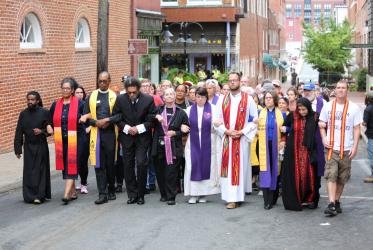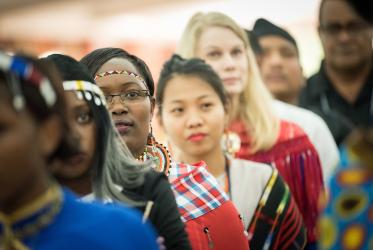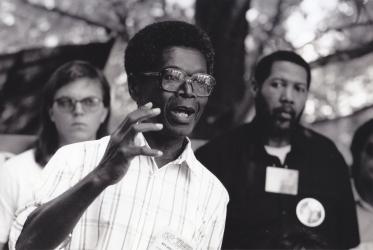An ongoing webinar series convened this week by the World Council of Churches (WCC) continues to offer theological reflections on “Hate Speech and Whiteness.”
During the session entitled “Legacy of Slavery, Structural Racism, and Religion,” Dr Iva E. Carruthers spoke about the confluence of situations that are especially ominous for the people of African descent in the US. Carruthers is a founding trustee and general secretary of the interdenominational organization, Samuel DeWitt Proctor Conference.
“In the midst of demographic shifts, America’s identity of whiteness is dying and the death rattle is felt around the world,” she said. “Centers of economic, religious and cultural power are shifting.”
Whiteness, as a movement, is at war with itself, she said. “However, there is hope!” she added. “Death and transformation always coexist.”
She reflected on what cost the world must pay for the demise of whiteness. “The overwhelming impact of COVID-19 on African American and Hispanic populations is staggering,” she continued. “The COVID-19 has exposed the underbelly of systems of racism, economic greed and denial of basic human rights to so many.”
The unresolved racial oppression born out of the enslavement of black people in America has been exposed, she said. “It would be a total misread of history to suggest that the current presidency of the US rang the alarm bell on the death of whiteness,” she said. “His rise to the presidency speaks more to him being the culmination of a 50+ year effort to mitigate today’s inevitable reality.”
On 17 May 2012, the US reached a data point in which there were more births of children of people of color than there were children of white parentage. “A view from the bridge portends that the intersection of racism, national populism and immigration is real and cannot be ignored,” she said. “But to those who represent a culture of dominance built upon so-called Christian democracy, with all its hate speech and whiteness, I offer a heuristic paradigm shift of conversation that begins with one question: ‘Where is your humanity?’ "
Jennifer Martin, from the United Church in Jamaica and the Cayman Islands, reflected that she is part of the legacy of slavery. “I grew up in a society which could not but recognize the mixing of the races, a biological fact seated in the plantation history of the country, the Caribbean region and beyond,” she said. “Nonetheless, the same society, undergirded by white institutions and traditions, continued the established practice of automatically devaluing, to varying degrees, things and cultures which were other than white.”
In Jamaica and the wider Caribbean, skin colour affected people’s life chances, Martin said. “Despite the historically entrenched constraints, some persons of black and other ethnic groups did manage to obtain elite education and training through government institutions and partly through some schools which had been financed by profits arising from slavery,” she said. “This preparation and grooming helped to position some such persons into seats of power in post-independent Jamaica and other Caribbean territories.”
The role of the black power movement in helping to clarify thinking on race matters in the Caribbean region was invaluable, Martin noted. “Apart from political and economic issues, the movement highlighted personal issues such as the beauty of black skin and facial features,” she said. “There has been a tradition in the area dating back to the days of slavery, of black voices refusing not to be heard despite the power and actions of white people to suppress voices which were not white.”
The geographical and linguistic spread of the Caribbean makes it difficult to speak of a generic Caribbean person, she said. "There are differences even among countries of the same linguistic group,” she said. “A global effort on the part of white people, as strong as that which was made in upholding a pristine image of whiteness, has been made for the purpose of thoroughly denigrating the image of blackness.”
The five sessions of webinars are being produced bv the WCC’s Theological Study Group of the Pilgrimage of Justice and Peace.
Prof. Dr Isabel Apawo Phiri, WCC deputy general secretary, in her opening remarks to the session, said that given the experience of the COVID-19 pandemic and the current events and protests, members of the Theological Study Group have offered their theological reflections on how racism is manifesting itself in these contexts, e.g. how certain groups, such as indigenous peoples, blacks, other ethnic minorities, migrants, etc are targeted and their situations exacerbated by the COVID-19 and structural racism.
The five sessions are moderated by Rev. Prof. Dr Fernando Enns, from the Association of Mennonite Congregations in Germany.
Learn more about the webinar series "Theological Reflections on Hate Speech and Whiteness"









